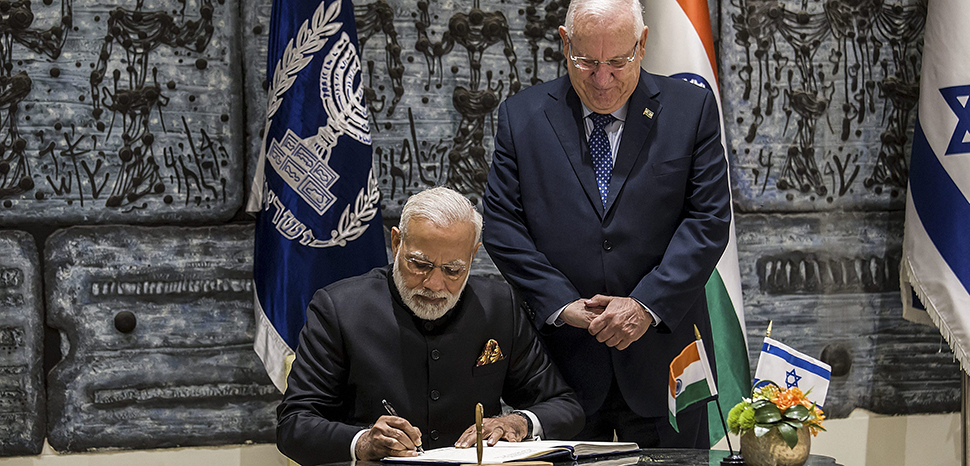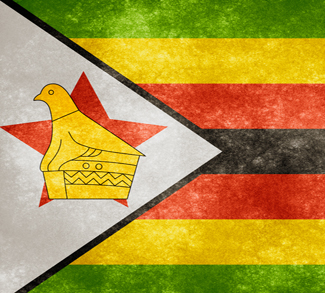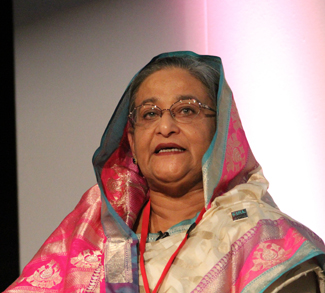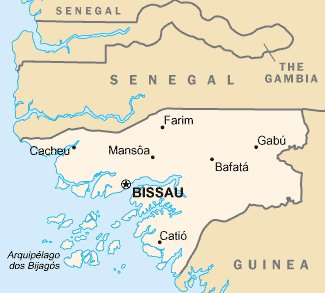The outbreak of conflict between Israel and Hamas, following Hamas’ terror attack during the early hours of October 7, 2023 created ripples not only across the Middle East but also across the globe. The conflict, with no end in sight, has caught several countries in the crossfire of geopolitical controversy. In the South Asian region, India’s position vis-à-vis the conflict is closely monitored not only by Israel, Palestinians, and Gulf countries, but also by its own citizens as well as countries like the United States (US) with whom its strategic ties are improving significantly. For India, the timing of the war is crucial, as it has come about at this juncture when its Middle Eastern policy has been considered one of the success stories of its foreign policy pursuits under the present government.
Over the past few years, India has been able to strike a good balance in its relations both with Arab states and Israel, not letting either of the two parties leave an impact on its ties with regional countries. Moreover, Israel’s increasing warming of relations with some of the key Gulf states opened a window of opportunity for India, too, to collaborate with them on certain issues of mutual interests. In view of the ongoing conflict, however, India would need to deal with the issue with utmost craftsmanship and not allow the conflict to disturb this momentum. It remains to be seen how seriously the issue of the Palestinian cause will become a factor (in India’s Middle East policy) to reckon with in the upcoming period, which otherwise has been on the wane lately.
Trajectory of India’s Middle Eastern Relations Since 2014
Under the leadership of the current prime minister, Narendra Modi, New Delhi has been able to strengthen its bilateral ties with almost all countries in the region. This has been a visible pattern since May 2014, when the Bharatiya Janata Party (BJP) made unrelenting efforts to transform India’s bilateral ties, particularly with the Gulf Cooperation Council (GCC) member states, Israel and Iran. It has been argued that “Modi sidesteps politico-strategic issues and concentrates on bilateral economic relations” and this enabled him to balance the ties with Middle Eastern countries, regardless of other issues in the region. For instance, India’s relations with the United Arab Emirates (UAE) have been elevated to a comprehensive strategic partnership, and this country is now considered as one of its strongest bilateral partners. Alongside, there is also a significant growth in engagements with Israel while maintaining cordial relations with Iran.
India’s robust ties with these countries, despite their relationships to each other, is signified by the fact that relations are no longer confined to traditional determinants, such as oil-energy trade and remittance-related activities. Currently, bilateral relations are increasingly marked by a considerable growth in economic partnerships, joint investments, strong political ties, growing defence and security cooperation, socio-cultural connectivity, and joint collaborations in the technological sectors, including for renewable energy and food security.
The economic importance of the Gulf region is testified by the fact that it is home to India’s third- and fourth-largest trading partners in the world, the UAE and Saudi Arabia respectively, and a similar growth in Indo-Israeli trade ties, with bilateral trade volume touching USD $10.1 billion (excluding defence) in 2022-2023. India has become an attractive trade partner for Gulf countries, which have depended on oil-based economies for several decades. Seeking ways to diversify their sources of revenue, these countries are now exploring economic opportunities with India in the non-oil sector, particularly food security and technology.
Lately, the increasing convergence of economic and strategic interests between India, Israel, and the UAE led them to sign a quadrilateral agreement with the United States (US) known as I2U2, in October 2021. One of the major objectives of this regional grouping is to collectively mitigate global challenges by focusing on investment in water, energy, transportation, space, health, food security and technology. In quick succession, India, Israel and the UAE initiated plans for the India-Middle East Food Corridor in 2022, followed by a similar initiative called the India-Middle East-Europe Economic Corridor (IMEEC), launched during the recently-concluded G20 Summit in New Delhi in September 2023. As a multimodal economic corridor, this venture aims to bolster economic development by promoting economic integration between Asia, Europe, and the Middle East.
The aforementioned developments are a reflection of a paradigm shift in the geopolitics of the Middle East, made possible by geopolitical realignment, and triggered by strong convergences of strategic and economic interests between Israel and regional countries, particularly following the signing of Abraham Accords in late 2021. Such an increasing warming of ties between Israel and the moderate Arab countries, undoubtedly, bettered the prospects for multi-aligned initiatives in the region, even involving emerging economies like India, which, otherwise, has been dealing with the regional states bilaterally. The emerging dynamic, as a result, has provided India with a favourable opportunity to forge partnerships with like-minded countries in the Middle East, which could likely lead to gradual expansion of its footprints in the wider region. But in the wake of the ongoing conflict, any joint collaborative initiatives involving Israel risk taking a backseat as many Arab states, including those that exhibited cordiality with Israel in recent years, would be sceptical of partnering with the Jewish state for fear and concerns of backlash from their own citizens. Considering the present dynamics, one of the main objectives of the Indian government would be to continue maintaining ties on bilateral basis, as it has been the case since the last few decades, and simultaneously monitoring the emerging developments in the region.
During the last nine years, New Delhi has followed a de-hyphenated policy when it comes to Israel and Palestine. In other words, India, under its current leadership, is carrying forward its relations with Israel on their own merit, independently, and keeping the Palestinian issue separated. This was not the case until few years ago as previous Indian governments linked the Israeli policy with the question of Palestine. This, in a way, had prevented India from harnessing the full potential of the Indo-Israeli cooperation, in particular. One of the first indications of this “de-hyphenated policy” was Modi’s stand-alone visit to Israel in July 2017, which was considered to be a strong message to the international community that India was not “apologetic about befriending Israel.” Likewise, India dropped the term “East Jerusalem” from official statements, and in a 2017 speech during a visit by Mahmoud Abbas, President of the Palestinian Authority, Modi expressed hope “to see the realization of a sovereign, independent, united and viable Palestine, co-existing peacefully with Israel.” These developments signalled that New Delhi’s Palestinian policy had also changed gradually, and India would attempt to treat its relationship with Palestine as relatively isolated from its relationship with Israel.
Implications of the Israel-Hamas War for India’s Middle Eastern Ties
Despite the prospects for regional collaboration for India in the Middle East, the ongoing war between Israel and Hamas has marred prospects for further collaboration, at least for the moment. For Israel’s regional relations, this could be a temporary diplomatic setback, mainly at this crucial stage when its existence as a state had begun to be politically accepted and diplomatically recognised by some of the key GCC states in the Middle East. A similar initiative, taken by the U.S. for Israel to normalise ties with Saudi Arabia, has been shelved for the moment in the wake of growing Arab criticisms of Israel for its ongoing strikes on the Gaza Strip.
For India, because of its historical ties with Middle Eastern countries and burgeoning strategic partnership with Israel, it will likely have to walk a diplomatic tightrope once again as a result of the present conflict between Israel and Hamas in the Gaza Strip, with rising concerns of expanding to other parts of the region. Over the past few years, the Indian government has been dealing with Israel, the Palestinians, and Arab countries separately without allowing any of them to affect respective bilateral relationships. Therefore, the question that looms large, in the minds of strategists and experts, is whether the Palestinian issue will resurface as a factor in India’s foreign policy vis-à-vis the Middle East and to what extent it will impact the respective ties.
Recent politico-diplomatic moves and statements, however, by India have made clear that New Delhi will continue its de-hyphenated relationships with Israel and Palestine. This gives an impression that India leans more towards Israel while its traditional support for the Palestinian cause is gradually diminishing. Tellingly, India’s voting record at international forums regarding resolutions considered critical of Israel is apparently changing, with New Delhi frequently opting to ‘abstain.’ In the past, India’s sporadic votes on certain UN resolutions against Israel have not seemed to dent its overall relations with Israel, so far. India’s careful balancing act, however, is visible when it reiterates its stance of supporting a two-state solution, sending humanitarian aid to Palestinians in the Gaza Strip, and at the same time expressing a strong “solidarity with Israel at this difficult hour.” India also voted, at the UNGA, against Israel’s settlement policy in November 2023. Furthermore, in mid-December, it voted in favour of a UNGA resolution that demanded an immediate humanitarian ceasefire and an unconditional release of the hostages. These gestures hint at India’s policy to deal with their bilateral relationships with each country separately, but continue with its balancing strategy.
On the other hand, the recent Hamas attack and the unfolding security situation, instead, will likely reinforce the counter-terrorism cooperation between India and Israel. Furthermore, certain security challenges and commonly shared threat perceptions emanating from non-state actors (terrorist and extremist groups) operating in the respective regions certainly help explain the further expansion of traditional military-security ties between these two countries as well as with others Middle Eastern countries. Since the beginning of the conflict, this has been an important aspect which the Indian government has flagged, even urging the international community to jointly combat the menace of terrorism. Modi was one of the first leaders who unequivocally condemned terrorism (when the Israel-Hamas conflict broke out), and a similar tone echoed by his foreign minister, Dr. S. Jaishankar, during the extraordinary joint meetings of the BRICS in late November last year. It is noteworthy that countries like Egypt, Saudi Arabia, and the UAE have major concerns regarding the presence of terror elements both within their respective territories and in the region. Tellingly, the gradually rising violent activities of the Yemen-based Houthi militias in the Red Sea should result in strengthening maritime security cooperation between India and the Gulf countries, let alone Israel. In the long run, a multilateral initiative in this regard could be explored in the interest of ensuring smooth international maritime trade passing through the strait of Bab el-Mandeb that links Asia and Europe.
Concluding Assessment
The internal noise in India ignited by the current Israel-Hamas conflict will likely remain for a while as the country heads towards a general election this year. But whether this war will have a major impact on India’s overall Middle Eastern or Israel policy is doubtful. In most cases, foreign issues have not had major impact on past Indian elections. It could be that anti-BJP or critics of Modi are likely to use the seemingly pro-Israel stance as a political card to put a pressure on the Indian government to exhibit strong support for the Palestinians, but that is unlikely to transform New Delhi’s stance. This is because the dynamics of the Indian political system have changed since the 1990s and 2000s, when the coalition government retained significant support from left-leaning political parties that were critical of India’s ties with Israel. Currently, with the exception of few sporadic criticisms at times like this (when there is a conflict), there is a discernible acceptance by the larger public of India’s growing ties with Israel and appreciations for the overall growth in its relations with the Gulf countries where there is a sizeable Indian expatriate community.
As Middle Eastern countries are increasingly adopting a “Look East” policy, India has been able to explore new domains of bilateral cooperation in non-traditional security spheres, such as renewable energy, healthcare, space cooperation, and climate change adaptation. Moreover, as almost all these countries are preparing for a post-hydrocarbon future by diversifying their economic sources, they would like to continue building further partnerships with India, and it holds true for New Delhi as well. This is precisely the reason why leaderships from both sides have continued to engage constantly throughout the conflict. Despite the growing convergence of interests between India and its Middle Eastern partners and its de-hyphenated foreign policy, what could be witnessed in the days to come is a slowdown, for the time being, in India’s joint-collaborations involving Israel and other Arab countries, but with potential for bilateral ties to flourish. Further, because the precedent of India’s policy toward the Israel-Palestine conflict has been a balancing act, a massive transformation in India’s Middle East policy because of the ongoing conflict cannot be expected imminently. Having said this, India should start mulling over having a Middle East-centric strategy to deal with the region holistically and not only focusing on strengthening bilateral cooperation, which appears to be more of transactional in nature.
The views expressed in this article belong to the authors alone and do not necessarily reflect those of Geopoliticalmonitor.com.




